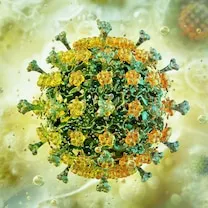Human Metapneumovirus (HMPV) is a respiratory virus identified in 2001. It belongs to the Pneumoviridae family and is related to the Avian metapneumovirus (AMPV). HMPV mainly affects the respiratory system and is active during late winter and spring.
Symptoms of (HMPV) Human Metapneumovirus
HMPV symptoms are similar to the flu or common cold. They include:
- Sore throat
- Fever
- Nasal congestion
- Cough
- Shortness of breath
In severe cases, HMPV can lead to pneumonia or bronchiolitis, needing hospitalization and oxygen therapy.
How HMPV Spreads
HMPV spreads through respiratory droplets when an infected person coughs or sneezes. It can also spread through contact with contaminated surfaces. Good hygiene practices are essential to prevent its spread.
High-Risk Groups
Young children, older adults, and individuals with weakened immune systems are at a higher risk of severe illness from HMPV. These groups should take extra precautions to avoid infection.
Prevention and Treatment
Currently, there is no specific antiviral therapy or vaccine for HMPV. Prevention measures include:
- Washing hands frequently with soap and water
- Using hand sanitizers
- Wearing masks in crowded or high-risk settings
- Avoiding close contact with sick individuals
Treatment for HMPV focuses on rest, hydration, and over-the-counter medications to relieve symptoms. Severe cases may require hospitalization and oxygen therapy.
Recent Outbreak and Public Concern
Recently, there has been a surge in HMPV cases in China, leading to public concern. However, health experts reassure that HMPV is not new and that the increase in cases is likely due to improved detection and surveillance.
Conclusion
HMPV is a respiratory virus causing flu-like symptoms, spreading through respiratory droplets and contact. High-risk groups include young children, older adults, and those with weakened immune systems. Prevention involves good hygiene practices, while treatment is supportive, focusing on rest and hydration. Stay informed and practice preventive measures to stay safe.
Read more news : click here
Get more information about HMPV : click here
